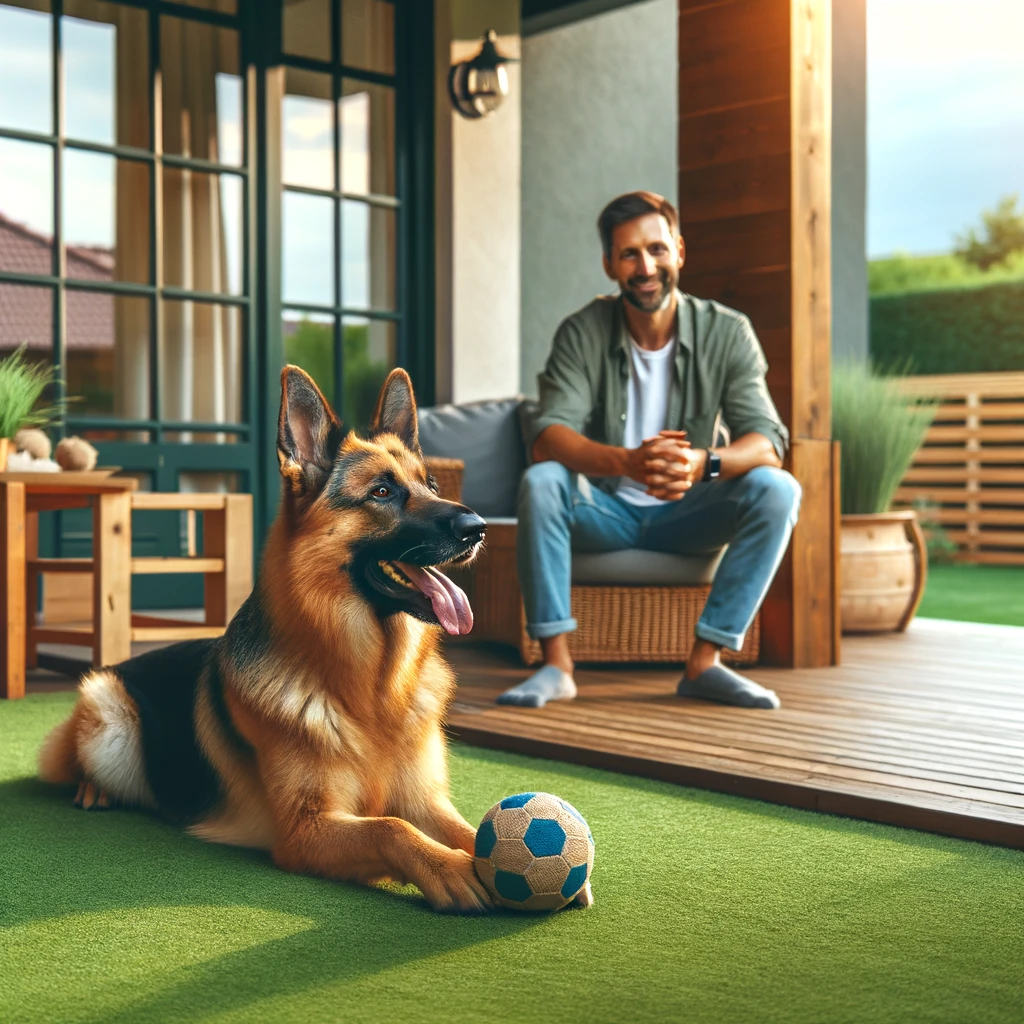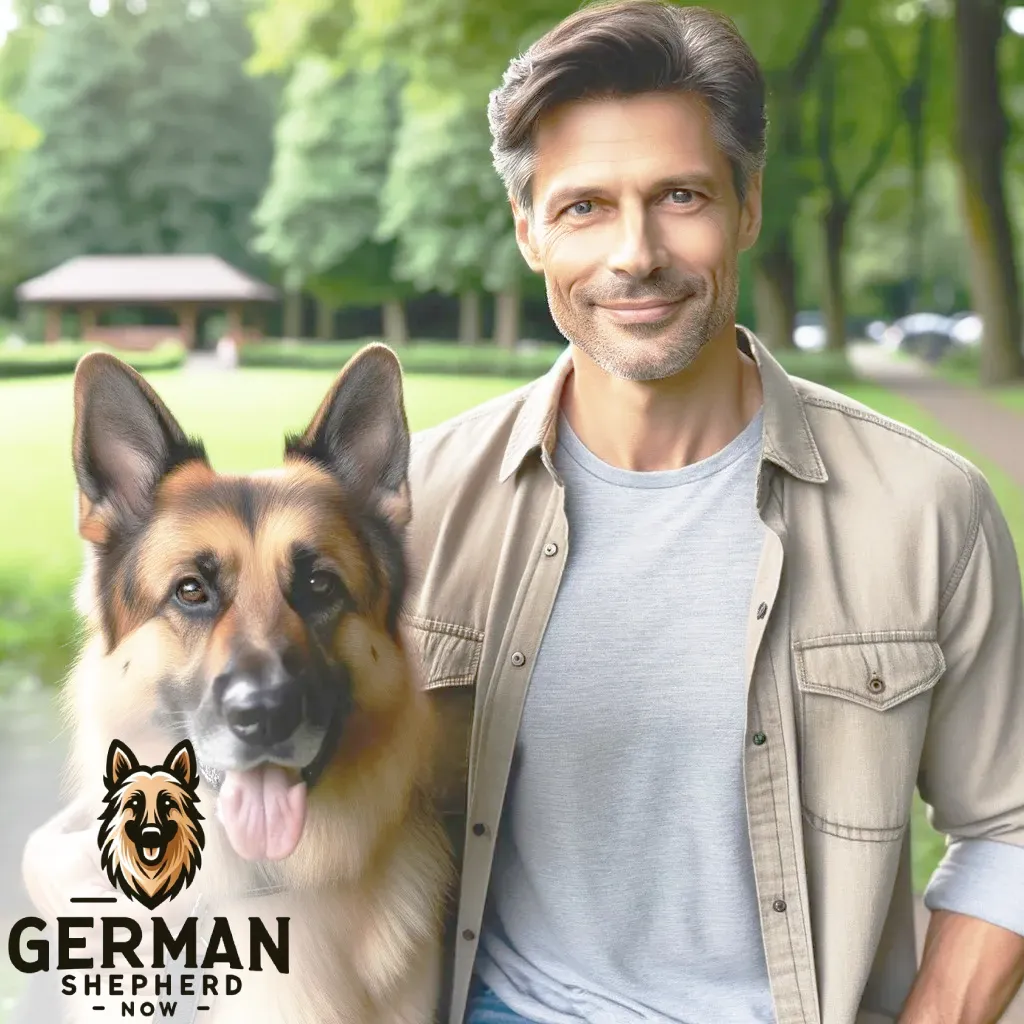Are German Shepherds Outside Dogs?

German Shepherds can adapt to living outdoors due to their hardy nature and thick coat.
Still, they thrive best with regular interaction, mental stimulation, and physical exercise with their human families.
Keeping a German Shepherd outside is not recommended, as social dogs require strong bonds and engagement with their owners for their well-being.
Upon closer look at the actual needs of German Shepherds, the evidence shows they should not live outside.
But their energy level and enjoyment of activity do make access to the outdoors ideal.
Finding the right balance is critical to providing a German Shepherd with the best care and living conditions.
Understanding the Ideal Living Environment for German Shepherds
Understanding their needs is crucial to ensure they lead a happy and healthy life.
This table breaks down the critical aspects of a German Shepherd’s nature and needs, comparing the benefits and drawbacks of indoor versus outdoor living environments.
| Aspect | German Shepherd Needs | Ideal Living Environment: Indoors vs Outdoors |
| Nature and Coat | Hardy and thick-coated, can adapt to the outdoors. | Preferably indoors for social interaction, with regular outdoor access for exercise. |
| Social and Emotional Needs | Highly social, requiring interaction and bonding. | Indoor living is primarily crucial to fulfilling their need for companionship and family bonding. |
| Exercise and Activity | High energy levels enjoy outdoor activities. | Daily outdoor exercise is important but should not substitute for indoor family time. |
| Breed Origins and Adaptability | Originated as herding dogs, resilient to outdoor conditions. | While resilient, they thrive more on interactive and stimulating indoor environments. |
| Health and Safety Considerations | Prone to hip dysplasia, sensitive to extreme weather. | Indoor living is safer, offering protection from weather extremes and health monitoring. |
| Behavioral Well-being | Can develop anxiety and behavioral issues if isolated outdoors. | Indoor living minimizes risks of anxiety and fosters a balanced temperament. |
| Housing Recommendations | Requires a secure space for exercise and relief. | Access to a fenced yard for play, with primary residence indoors for optimal well-being. |
| Social Interaction | Pack animals that crave human companionship. | Indoor living enhances social interaction, reducing risks of behavioral problems. |
Origins as German Herding Dogs
To understand their suitability for indoor versus outdoor life, it is helpful to first look at where German Shepherds come from.
The breed originated in Germany in the late 1800s when Captain Max von Stephanitz, considered the father of the German Shepherd, sought to develop the ideal herding dog for rural sheep ranchers.
Selective breeding focused on strength, speed, intelligence, loyalty, and trainability, producing an versatile farm dog well-equipped for demanding work.
Their weather-resistant double coat also enabled them to withstand long hours in the open fields and seasons of the German countryside.
German Shepherds are resilient and enjoy spending time outdoors.
Their responsibilities go beyond being outside.
To raise German Shepherds that are both happy and healthy, it is essential to provide them with access to both the outdoor and indoor environments.
Let’s delve into why having access to both worlds is crucial for raising German Shepherds.
Balancing Outdoor Activity With Indoor Bonding
Though their energy level and exercise need plenty of time outdoors, German Shepherds should not live outside.
Their social nature and need for family companionship means sharing indoor home life provides the best scenario.
Outdoors, German Shepherds thrive on brisk walking, jogging, interactive play in the yard, and participating in canine sports.
A minimum of 1-2 hours of activity daily is recommended. This stimulates their body and mind.
But the other half of a healthy, balanced lifestyle involves relaxing indoors.
Bonding with family through cuddling, training, grooming, and being present helps German Shepherds feel safe, secure, and confident. Access to climate control and soft beds brings comfort.
Finding the right mix of energetic outdoor time plus affectionate downtime inside prevents boredom and meets German Shepherds’ physical and emotional needs.
Why German Shepherds Don’t Do Well Living Outside Full-Time
While German Shepherds can spend extended periods outdoors, living exclusively outside subjects them to several risks and problems:
- Lack of family interaction and affection leads to anxiety, loneliness, and behavioral issues.
- Exposure to weather extremes such as heat, cold, rain, snow, and storms.
- Vulnerability to parasites like fleas, ticks, and intestinal worms.
- Increased likelihood of nuisance barking and escape attempts.
- Minimal mental stimulation leads to boredom and frustration.
- It is challenging to monitor their health, appetite, and bathroom habits.
- Decreased safety from cars, wildlife, stray dogs, and human threats.
German Shepherds denied access to indoor home life face increased health and behavior problems that impact welfare. An indoor/outdoor lifestyle prevents these issues.
Ideal Housing Accommodations
So, what exactly constitutes the best housing environment for a German Shepherd? Most experts recommend:
- Primary residence inside the home full-time, except for bathroom breaks and exercise. This enables bonding, training, playtime, and monitoring of their well-being.
- Access a fenced backyard for play, zoomies, toilet needs, and lounging in nice weather. The size should accommodate running and fetch games.
- It’s recommended to use an outdoor kennel or shelter only for temporary purposes or when leaving your pet home alone. Overnights alone outdoors are not ideal long-term.
- Outdoor time daily for walking, jogging, hiking, or structured activity. German Shepherds need plenty of exercise and mental work.
- Climate control, including heating and air conditioning, is essential as German Shepherds do not tolerate temperature extremes well.
- Cozy spots for resting inside near family members, like dog beds in main living areas. This eases their protective instincts.
Adjusting the indoor/outdoor balance based on climate, age, and health status allows German Shepherds to live. But most of the time, snuggling inside is ideal for their welfare.
Meeting Their Social Needs
One of the main reasons indoor family life is so essential involves the social needs of German Shepherds. Pack animals crave and require regular companionship and affection from their human and canine housemates.
Isolation outdoors leaves them under-stimulated mentally. This increases problematic behaviors like excessive barking, hyperactivity, anxiety, and destruction.
Access to positive indoor interactions helps German Shepherds feel content. Activities including brushing, massaging, obedience training, puzzle toys, and snuggling meet their social needs.
They aim to please their families and thrive on human bonding.
Sudden outdoor isolation can be detrimental for retired service or working German Shepherds accustomed to constant close contact with handlers. Making them cherished housemates is critical.
Balancing Health Considerations
Certain health factors also determine the ideal living conditions for a German Shepherd dog.
Their double coat makes temperature extremes hazardous if trapped outdoors.
Hot and humid climates can lead to fatal heat stroke without climate-controlled spaces to cool down.
Cold conditions can chill their core body temperature without a warm, dry place to shelter.
Allergies, arthritis, hip dysplasia, and other conditions make soft indoor beds far more comfortable long-term than hard outdoor surfaces.
And caring for aging senior German Shepherds is most accessible with indoor home access.
Considering their health vulnerabilities and social needs, keeping a German Shepherd inside becomes the clear choice.
Daily outdoor exercise remains important, but family togetherness indoors is essential.
An Active, Affectionate Breed
When determining if high-energy German Shepherds are more “outside dogs,” the resounding answer is they are not.
This breed thrives in sharing their lives with human and canine loved ones.
Providing engaging activities outdoors is also integral for their welfare. The ideal scenario involves plenty of both.
German Shepherds epitomize the well-balanced, active housemate ready for adventure but always eager to return home for snuggle time!
Back Inside Again
In conclusion, German Shepherds are not well-suited to reside outdoors away from family interaction.
Their heritage as German herding dogs was built on close collaboration with shepherds. Daily vigorous exercise remains crucial.
But most of their time should be spent indoors, participating in family life.
Maximizing their energetic nature and loving personality leads to the happiest outcome for dogs and owners alike.
German Shepherds belong inside right next to the rest of their human pack.

I’m Martin, and I grew up in the super cool city of Seattle. You know, the place with all the incredible mountains and forests? Yeah, that’s my playground!
Ever since I was little, I’ve been all about nature. I used to wander around the woods with a notebook, doodling all the cool plants and animals I’d find.
